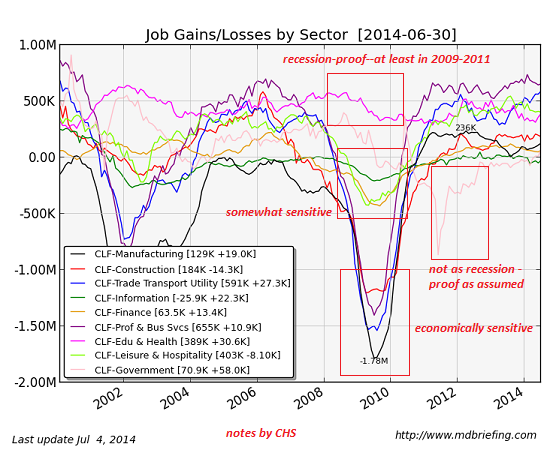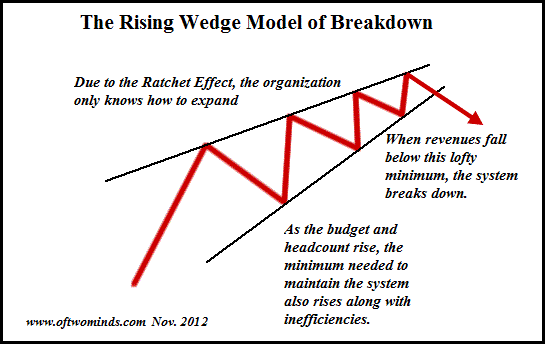Skip to comments.
How Recession-Proof Is Your Job Sector?
Of Two Minds ^
| 07/08/2014
| Charles Hugh-Smith
Posted on 07/08/2014 12:46:53 PM PDT by SeekAndFind
History suggests that previously sound assumptions about financial security and recession-proof sectors may not apply in the next recession.
Nobody wants to lose their job in a recession, but that's what happens when credit tightens, profits fall and tax revenues decline. Every enterprise that can't borrow unlimited sums of money at near-zero interest rates has to cut costs, and since labor and labor overhead (pension contributions, healthcare insurance, etc.) are the biggest expense for the vast majority of enterprises (including government agencies), payroll must be trimmed one way or another: either by lay-offs or by attrition, i.e. not hiring replacements for workers who retire or quit.
Some sectors are highly sensitive to the economic cycle. Courtesy of Market Daily Briefing, here is a chart of each primary job sector's gains and losses over the past decade. I have added boxes to identify the sectors most sensitive to economic contraction (i.e. recession) and those that are less sensitive.
The most recession-proof sector is (no surprise here) Education and Health.Manufacturing, transportation and construction are highly sensitive, as any credit hiccup quickly cuts into auto and home sales, which then cuts into the transport of raw materials and finished goods within these sectors.

Though government employment is generally considered rock-solid due to the job security provisions of civil service and public union contracts, as a sector, government isn't quite as recession-proof as is widely assumed. Government on all levels (Federal, state and county/city) subcontracts many services, and government payrolls can be trimmed by attrition.
This chart raises two implicit questions:
1. What if the Federal Reserve's monetary easing fails to pull the economy out of the next recession?
2. What if structural changes are eroding the recession-proof sectors?
In other words, what might be different in the next recession?
The reason why these questions arise is the Federal Reserve has already pursued extraordinary policies to the point of exhaustion. The Fed has not just emptied its bag of tricks during the past six years since 2008, it has run these policies to the point of diminishing returns: interest rates can't go any lower, the Fed already owns much of the Treasury bond market and mortgage market, it continues to intervene in capital and stock markets, and so on.
The Fed did not flood the U.S. and global economies with free money and credit and then withdraw this unprecedented intervention: it has kept its foot on the accelerator for six long years.
Only now that its monetary heroin is triggering blowback in various global markets is the Fed tapering a bit of its massive interventions. But the question remains: given that the Fed has gone all-in for six long years, what's left for it to do in the next recession that isn't even riskier than its current all-in gamble?
Though many seem to have fallen for the Fed-induced fantasy that business cycles and credit cycles have been banished and the stock market and economy can both loft higher forever, the reality is that flooding the economy with cheap credit and buying assets to inflate asset bubbles have only guaranteed the next turn of the credit cycle will be more disruptive than previous turns, as the quality of the debt that's been issued is even more marginal than in previous expansions.
This is why Gordon Long and I consider this a Subprime Economy: the expansion is all based on increasingly marginal borrowers and marginal debt.
In effect, the Fed has extended the financialization process to the point that the entire economy is increasingly dependent on subprime credit/debt that is highly sensitive to any decline in income and asset prices.
We can visualize this dependency on marginal borrowing and debt as a rising wedge that reflects the Ratchet Effect: as the system becomes ever more dependent on an expansion of marginal debt based on stagnant income and phantom assets, it also becomes increasingly prone to collapse:

In effect, the Status Quo has no response to this heightened vulnerability to collapse of the credit bubble. The Fed's monetary heroin does not address the need to rationalize the bloated, wasteful, inefficient sources of malinvestment and unsustainable spending: higher education, healthcare (the previously recession-proof sectors) and government spending based on cronyism and politically sacrosanct fiefdoms (such as defense spending).
Yet such rationalization is unavoidable. I highly recommend this recent article in Foreign Affairs on the larger context of jobs and bloated sectors that have been protected from innovation, competition and transparency: Labor, Capital and Ideas in the Power Law Economy.
History suggests that previously sound assumptions about financial security and recession-proof sectors may not apply in the next recession. That means each household will have to look after it's own financial security rather than blindly rely on assumptions which may not hold in the next credit contraction.
In my view, the only "recession-proof" income is one you own and control, preferably drawn from a variety of sources so it is not too dependent on any one sector or on the doomed expansion of marginal debt and asset bubbles.
TOPICS: Business/Economy; Society
KEYWORDS: industry; recession; sector
To: SeekAndFind
I work for an electrical utitliy. I hope my job is pretty secure. I don’t take anything for granted though!
2
posted on
07/08/2014 1:09:35 PM PDT
by
vpintheak
(I will not comply!)
To: SeekAndFind
There will always be grave diggers.
3
posted on
07/08/2014 1:20:26 PM PDT
by
lurk
To: SeekAndFind
With the widespread legal approval of gay marriage, there definitely will be a coming boom in divorce law.
4
posted on
07/08/2014 1:21:37 PM PDT
by
nascarnation
(Toxic Baraq Syndrome: hopefully infecting a Dem candidate near you)
To: SeekAndFind
The biggest “business” in America is now Government, and business is booming.
5
posted on
07/08/2014 1:37:47 PM PDT
by
Hugin
To: SeekAndFind
Banking - Regulatory Reporting. Lots of money in the business, and working on something that is required by law.
To: SeekAndFind
Oh, piffle. I’m enjoying the FREEDOM that unemployment brings! I’m exploring my PASSION as Nancy Peliso directed me to do!
*SPIT*
BUMP for later and further analysis, then to update my resume.
We’re ALL Free Agents, now. Always have been, really. :)
7
posted on
07/08/2014 1:44:45 PM PDT
by
Diana in Wisconsin
(I don't have 'Hobbies.' I'm developing a robust Post-Apocalyptic skill set...)
To: vpintheak
Mine appears to be somewhat secure. Depends on the rumor mill.
8
posted on
07/08/2014 1:52:43 PM PDT
by
wally_bert
(There are no winners in a game of losers. I'm Tommy Joyce, welcome to the Oriental Lounge.)
To: SeekAndFind
This is a strange economy. For 35 years I could walk into any auto repair shop and walk out with a job. Last winter the shop I had worked in for 9 years got so slow somebody had to get laid off.
Today I visited a shop that builds race cars and go fast street machines. They were so busy they were turning work away. People are buying ten grand worth of performance parts and custom fabrication on one car. I saw a WRX that will probably end up having twice that spent on it.
But the folks with a Camry or 4Runner can't afford tires and brakes.
I chatted with the owner of both shops. I think I talked my way into a job.
9
posted on
07/08/2014 2:11:48 PM PDT
by
SpeakerToAnimals
(I hope to earn a name in battle)
To: SpeakerToAnimals
I assume you are a mechanic...
How long a training must one go through in order to learn the trade, good enough to be employable?
To: SeekAndFind
It is a bit different today than 35 years ago. The best route into the business is an apprenticeship. I have trained several who later were ASE masters. If you have a person in mind I can offer some tips on finding the right shop. Freepmail me if I can help a young conservative learn a trade where one can earn while learning.
11
posted on
07/08/2014 3:15:08 PM PDT
by
SpeakerToAnimals
(I hope to earn a name in battle)
To: SpeakerToAnimals
So, you’re saying that one does not need to go to trade or auto school?
To: SeekAndFind
Yes and no. A trade school will teach the theory. There will be a little hands on. 3 to 5 years is about the timeframe to move from apprentice to technician. ASE testing is open to anybody but one must be employed for 5 years in the industry to get master tech certificate.
Get an ASE study guide and take sample tests until confident. Then go take the tests. Passing the 8 auto tests will get an ambitious youngster in the door. Spend the tuition money on tools.
13
posted on
07/08/2014 4:24:15 PM PDT
by
SpeakerToAnimals
(I hope to earn a name in battle)
To: SeekAndFind; SpeakerToAnimals
I wish people would be less snotty about learning a trade; if a lot of these brainless university students in the 18-22 range were more focused on earning a living rather than extending their high school years, there wouldn’t be a student loan debt crisis threatening to capsize the economy.
14
posted on
07/08/2014 8:58:19 PM PDT
by
CorporateStepsister
(I am NOT going to force a man to make my dreams come true)
To: CorporateStepsister
I do not believe the old adage that one must get a college education to get a good job. Skills learned as an apprentice can be valuable.
15
posted on
07/09/2014 6:55:37 AM PDT
by
SpeakerToAnimals
(I hope to earn a name in battle)
To: SpeakerToAnimals
College to me is kind of something you should do if you have initiative to really build your own accomplishments while there. Unfortunately students go to school not knowing what it is they want to do and waste space and time.
At the risk of being flamed, I dislike how university is treated as a matchmaking service, women going solely to meet and marry a man, not make the most of a good education and build something for their own future.
I wish learning a specific trade/skill weren’t looked down on.
16
posted on
07/10/2014 8:17:57 AM PDT
by
CorporateStepsister
(I am NOT going to force a man to make my dreams come true)
Disclaimer:
Opinions posted on Free Republic are those of the individual
posters and do not necessarily represent the opinion of Free Republic or its
management. All materials posted herein are protected by copyright law and the
exemption for fair use of copyrighted works.
FreeRepublic.com is powered by software copyright 2000-2008 John Robinson

